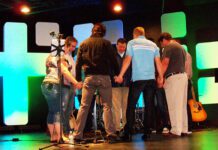Worship transitions….if you’ve been on the worship change highway for even a little while, you know that it’s not exactly a smooth, four-lane thoroughfare. Especially at the beginning, the journey to worship change can resemble a cliff-hugging, needle pin curve excursion on a class-five back road, the kind best navigated in something known as a utility vehicle (renamed, “futility vehicle” for those who’ve just hit their second or third worship wash-out…….)
While the road to worship change can be bumpy, there are good reasons why we choose the road less traveled, not the least of which is drawing our unsaved neighbors and friends into what they were created to do (see Romans 1): the unapologetic, undivided honor of their Creator/Redeemer. This is no easy task. Basically, people outside the church are an increasingly picky lot. Gone are the days when we could simply hang out our shingle and announce, “We’re open for business!” Gone are the days when, if we built it, they would come. On the cusp of the new millennium, the unchurched are opting for a steaming cup of Starbucks espresso and good café conversation over a styrofoam serving of tepid Sanka at the serve-yourself fellowship table. They’re participating in a chat-room discussion on spirituality instead of struggling to keep up with a six-page-bulletin-hymnal-plus-three-supplements service. They’d rather watch their little tike kick the soccer ball into the wrong goal than kick Mrs. Schmidt’s backside during the Nunc Dimmittis. And they’re taking their pre-teens to see, “Prince of Egypt” instead of subjecting them to this week’s flannel board version of Moses in the bullrushes.
But, lest we think the unchurched person’s absence from our churches is only about hip-ness, convenience, and self-interest, at the base of their non-involvement are really three gut-level questions: “Do you know God, do you live in 2001, and do you have a story?” Number one is scary. We may know a lot about God, but actually “know” God personally? Hmmm. Number two seems irrelevant. Of course we live in 2001…we’re here, aren’t we? Then again, we might live in 2001 six days of the week and opt for 1952 on Sundays. And number three, well, everybody has a story. Our church was chartered in 1968. We have an annual budget of $256,000. We’re on our tenth pastor and thirteenth organist. No? That’s not what they mean? They want to know what it meant to be Christian two thousand years ago? They want to know who Luther was? They want to know why we say recite creeds and why we eat cardboard wafers and drink thimbles of Manischevitz every other week? Really? Really.
So, all you adventurous “four-wheelers” out there, go ahead and upgrade your coffee ministry. Go ahead and streamline your services. Go ahead and let the under-fives dance to worship music in the front rows. Go ahead and set the preteens loose on a home video production of the Exodus, complete with song clips from some of their favorite artists. Just remember, reaching the unchurched is no longer about being the best show in town. It’s about authenticity, which means, we are who we say we are – a people passionately in love with God, a people living passionately our spot on the timeline, and last but not least, a people drawing passionately, faithfully, and creatively from the riches of our past.
As I talk with pastors and worship leaders in various parts of the country, most have been bumping along through the tough terrain of worship change for several years. After a year on hair-raising, teeth-rattling by-ways, some have progressed to forest service roads – better known as “washboard” sections. They’re starting to see small but encouraging gains in attendance, especially among the dechurched of their own congregation. Others have actually emerged onto paved, two-lane highways…sure, there are the requisite potholes and detours, but they’re beginning to attract churched folks from a wide array of denominations,and can claim a ten to fifteen attendance rate by the unchurched (roughly, those who have not attended church – aside from weddings, funerals or holidays – for two or more years.)
Yet, this is not the biggest problem they face. The biggest problem is that they are caught in a time warp and are trying to people in the culture of 1998 with contemporary worship models that are no longer contemporary.













